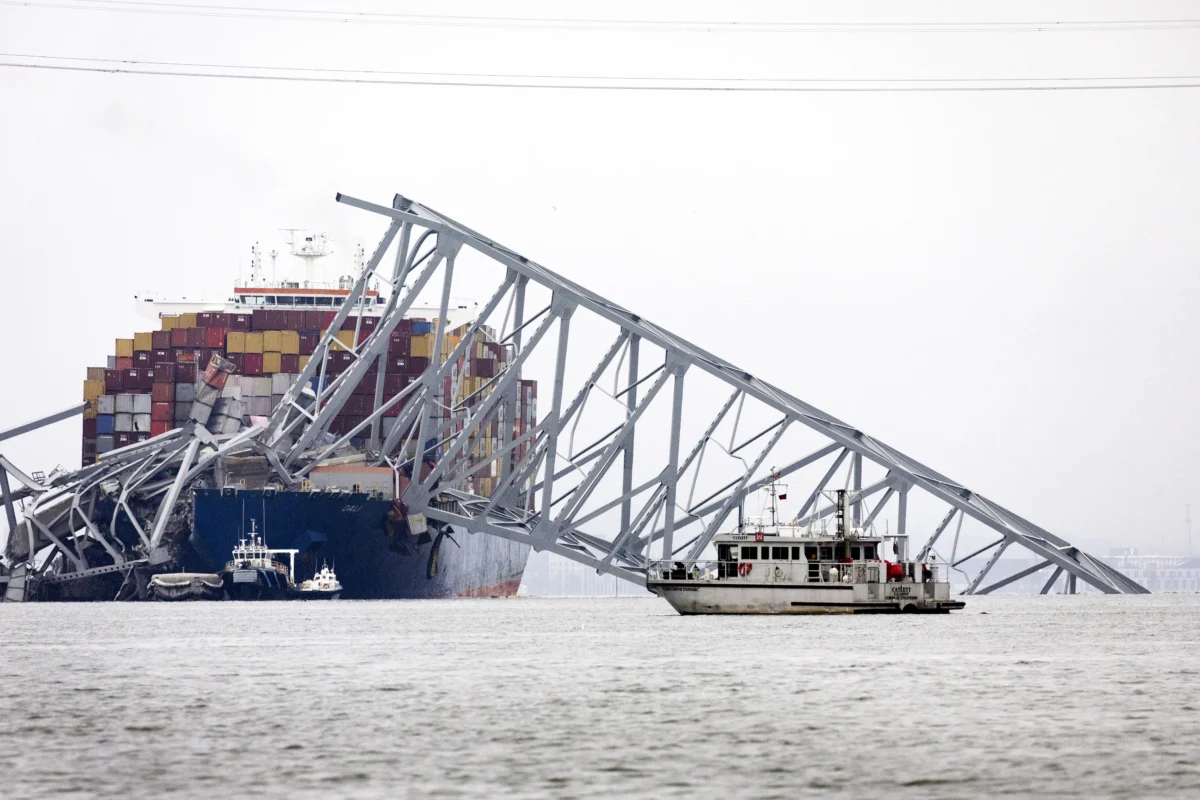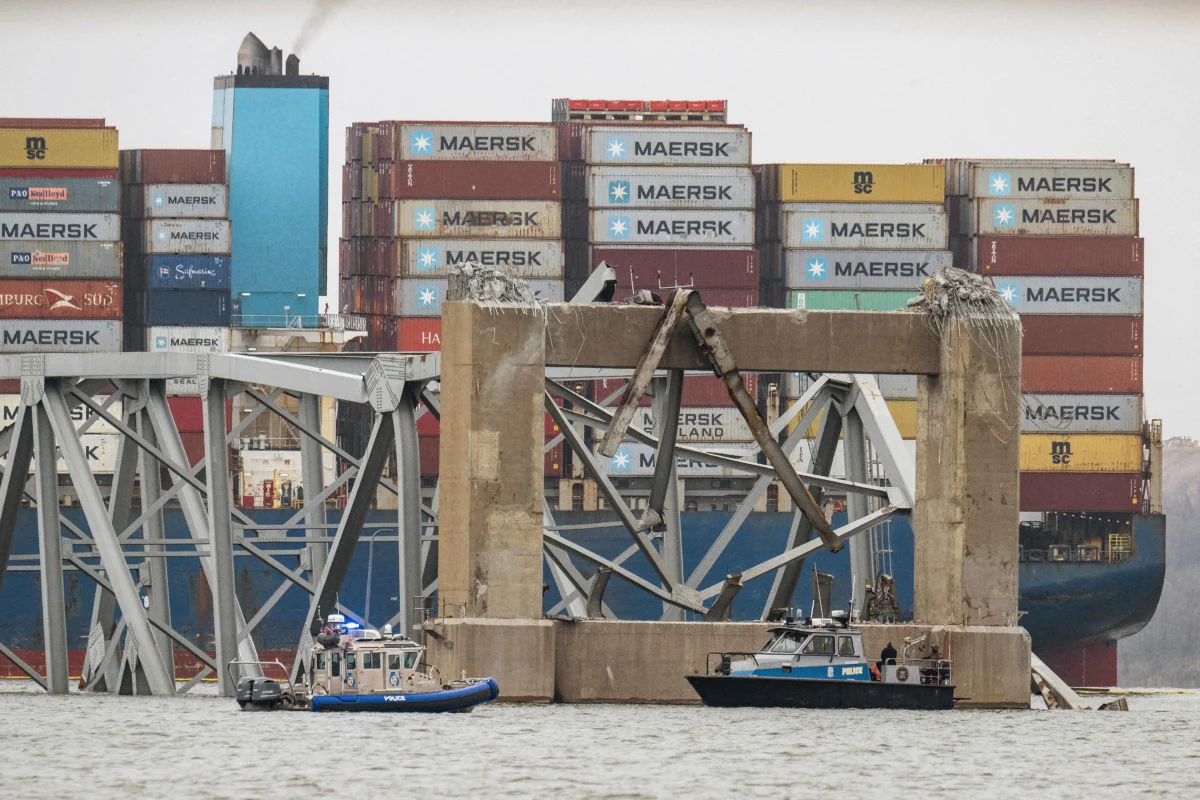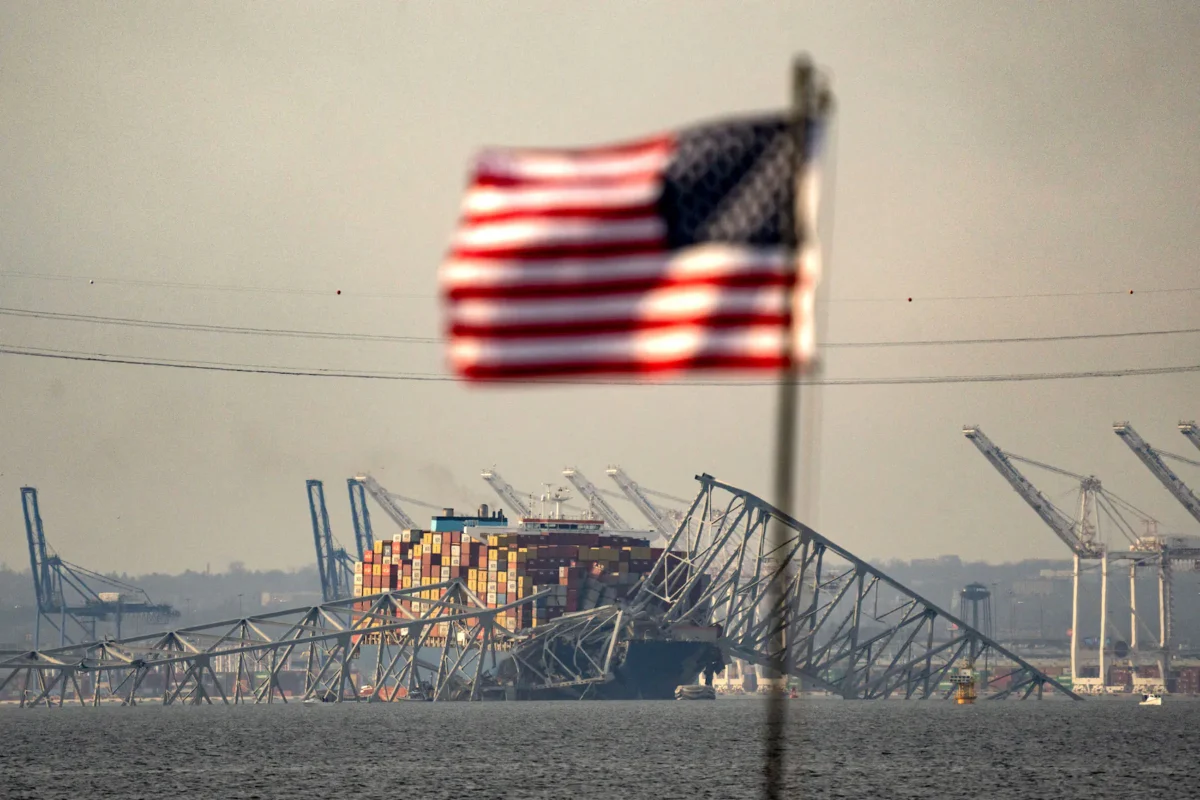The Biden administration on Thursday approved $60 million in immediate federal aid requested by the state of Maryland, as federal and local authorities rally to tackle the immense challenge of clearing the collapsed Francis Scott Key Bridge in Baltimore and reopening shipping lanes.
Recovery efforts are in full swing, with the immediate funding to go towards helping the region get back on its feet as soon as possible.
On Thursday, the U.S. Army Corps of Engineers was busy coordinating the transport of the largest crane on the Eastern Seaboard to the site of the collapsed bridge to help remove the wreckage that has brought the region’s key shipping route to a standstill.
The crane, which can lift 1,000 tons, is expected to arrive on Thursday evening. Sen. Chris Van Hollen (D-Md.) said a second crane with a 400-ton capacity could arrive by Saturday.
Currently, 32 members of the Army Corps of Engineers are surveying the scene of the collapse and 38 Navy contractors are working on the salvage operation, Mr. Van Hollen said.
In an evening press conference, Maryland Gov. Wes Moore said the state is “deeply grateful” for the federal support.
With aid now approved and on the way, he said, “The best minds in the world are coming together to collect the information that we need to move forward with speed and safety in our response to this collapse.”
But he reminded people to prepare for the “very long road ahead” for the state’s recovery following the loss of a critical piece of infrastructure.
“Government is working hand in hand with industry to investigate the area, including the wreck, and remove the ship,” he said, adding that the quick aid is needed to “lay the foundation for a rapid recovery.”
The devastation left behind after the powerless cargo ship struck a support pillar early Tuesday is extensive.
The crash caused the bridge to break and fall into the water within seconds. Authorities had just enough time to stop vehicle traffic but didn’t get a chance to alert a construction crew fixing potholes on the bridge.
Divers recovered the bodies of two male construction workers from a pickup truck in the Patapsco River near the bridge’s middle span Wednesday, but officials said they have to start clearing the wreckage before anyone could reach the bodies of four other missing workers.
State police have said that based on sonar scans, the vehicles appear to be encased in a “superstructure” of concrete and other debris.
The victims were from Mexico, Guatemala, Honduras, and El Salvador, Maryland State Police Superintendent Colonel Roland L. Butler, Jr. said. At least eight people initially went into the water when the ship struck the bridge column, and two of them were rescued Tuesday, officials said. One has since been released from hospital.
During the Baltimore Orioles’ opening day game Thursday, Sgt. Paul Pastorek, Cpl. Jeremy Herbert and Officer Garry Kirts of the Maryland Transportation Authority were honored for their actions in halting bridge traffic and preventing further loss of life.
The three said in a statement that they were “proud to carry out our duties as officers of this state to save the lives that we could.”

Sri Lanka-Bound Ship
National Transportation Safety Board officials boarded the ship, the Dali, to recover information from its electronics and paperwork and to interview the captain and crew members. Investigators shared a preliminary timeline of events before the crash, which federal and state officials have said appeared to be an accident.
Of the 21 crew members on the ship, 20 are from India, Randhir Jaiswal, the Indian foreign ministry spokesperson, told reporters. One was slightly injured and needed stitches, but “all are in good shape and good health,” Mr. Jaiswal said.
The Dali, which is managed by Synergy Marine Group, was headed from Baltimore to Sri Lanka. It is owned by Grace Ocean Private Ltd. and was chartered by Danish shipping giant Maersk.
Synergy extended sympathies to the victims’ families in a statement early Thursday.
“We deeply regret this incident and the problems it has caused for the people of Baltimore and the region’s economy that relies on this vitally important port,” Synergy said, noting that it would continue to cooperate with investigators.
Economic Pain
The collapse of the bridge, which carried 30,000 vehicles a day, has brought the region and its economy to a standstill.
The port disruption will affect not only thousands of dockworkers and commuters but also U.S. consumers, who are likely to feel the impact of shipping delays.

Scott Cowan, president of the International Longshoremen’s Association Local 333, said the union is scrambling to help its roughly 2,400 members whose jobs are at risk of drying up until shipping can resume in the Port of Baltimore.
“If there’s no ships, there’s no work,” he said. “We’re doing everything we can.”
The governors of New York and New Jersey offered to take on cargo shipments that have been disrupted to try to minimize supply chain problems.
Environmental Impact
The huge vessel, nearly as long as the Eiffel Tower is tall, was carrying nearly 4,700 shipping containers, 56 of them with hazardous materials inside. Fourteen containers were destroyed, and two containers fell overboard, officials said. Industrial hygienists who evaluated the contents in the 14 identified them as perfumes and soaps, according to the Key Bridge Joint Information Center.
“There was no immediate threat to the environment,” the center said.
About 21 gallons (80 liters) of oil from a bow thruster on the ship is believed to have caused a sheen in the waterway, Coast Guard Rear Adm. Shannon Gilreath said Thursday.
Booms were placed to prevent any spreading, and state environmental officials were sampling the water.
Mr. Gilreath said cargo containers are also hanging dangerously off the side of the ship at the moment, adding, “We’re trying to keep our first responders … as safe as possible.”

Divers sent to work beneath the bridge debris and container ship will encounter challenging conditions, including limited visibility and moving currents, according to officials and expert observers.
“Debris can be dangerous, especially when you can’t see what’s right in front of you,” said Donald Gibbons, an instructor with the Eastern Atlantic States Carpenters Technical Centers.
President Joe Biden has pledged that the federal government will pay the full cost of rebuilding the bridge, although his promise has met with pushback from some members of Congress, among others.
Jamal Simmons, a Democratic strategist and former communications director for Vice President Kamala Harris, said, “Let’s be clear about the tragedy in Baltimore. That bridge didn’t just collapse. There was no earthquake. The bridge was knocked down (apparently) by a private ship that lost control. Shouldn’t they be at least partly responsible for fixing it?”
On Wednesday, Treasury Secretary Janet Yellen told MSNBC she expected insurance payments to some of the rebuild costs.
Transportation Secretary Pete Buttigieg, who met Thursday with supply chain officials, has said the Biden administration was focused on reopening the port and rebuilding the bridge, but he did not put a timeline on those efforts.
From 1960 to 2015, there were 35 major bridge collapses worldwide due to ship or barge collisions, according to the World Association for Waterborne Transport Infrastructure.
The Associated Press contributed to this report.
From The Epoch Times

